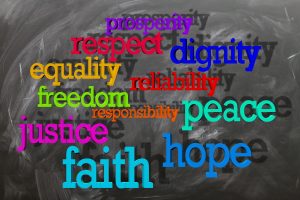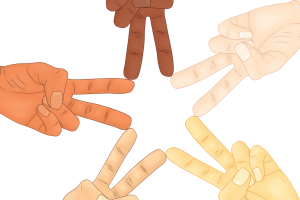Facing History and Ourselves [web resource]
 Facing History use lessons from history to teach about racism, antisemitism, and prejudice to help students connect choices made in the past to those they will confront in their own lives. Read more ›
Facing History use lessons from history to teach about racism, antisemitism, and prejudice to help students connect choices made in the past to those they will confront in their own lives. Read more ›
 Facing History use lessons from history to teach about racism, antisemitism, and prejudice to help students connect choices made in the past to those they will confront in their own lives. Read more ›
Facing History use lessons from history to teach about racism, antisemitism, and prejudice to help students connect choices made in the past to those they will confront in their own lives. Read more ›
 The Center for Research on Learning & Teaching (CRLT) at the University of Michigan offers the following guidelines to help instructors facilitate classroom discussion around controversial issues. Read more ›
The Center for Research on Learning & Teaching (CRLT) at the University of Michigan offers the following guidelines to help instructors facilitate classroom discussion around controversial issues. Read more ›
No doubt many young people across the country are finding this moment extremely scary. Parents, caregivers and teachers can help children cope. Read more ›
 In regard to the Capitol riot, focusing on facts from reliable sources and experiencing historic moments can be teachable moments. To address the subject, consider these tips from Dr. Sigal Ben-Porath an expert in civic education at the University of Pennsylvania Graduate School of Education. Read more ›
In regard to the Capitol riot, focusing on facts from reliable sources and experiencing historic moments can be teachable moments. To address the subject, consider these tips from Dr. Sigal Ben-Porath an expert in civic education at the University of Pennsylvania Graduate School of Education. Read more ›
 The National Education Association and National PTA commissioned a series of online focus groups to survey American public school students in grades 7-12 about the unprecedented challenges they are facing. Read more ›
The National Education Association and National PTA commissioned a series of online focus groups to survey American public school students in grades 7-12 about the unprecedented challenges they are facing. Read more ›
 If you’re new to teaching or looking to learn more about digital tools for teachers such as Google Classroom, Microsoft Teams, or Flipgrid–and all the related apps and resources–here’s where to get started. Tech & Learning list the basics for each one, including how to get started, plus tips and advice to get the most out of your experience. Read more ›
If you’re new to teaching or looking to learn more about digital tools for teachers such as Google Classroom, Microsoft Teams, or Flipgrid–and all the related apps and resources–here’s where to get started. Tech & Learning list the basics for each one, including how to get started, plus tips and advice to get the most out of your experience. Read more ›
 Online learning can create unique challenges for students, as they don’t have in-person signals such as bell schedules or classroom cues to help them stay focused and on track during the day, writes middle school language arts and social studies teacher Kasey Short for Edutopia. Short developed online tools to help her students organize their time and work even while they’re remote. Read more ›
Online learning can create unique challenges for students, as they don’t have in-person signals such as bell schedules or classroom cues to help them stay focused and on track during the day, writes middle school language arts and social studies teacher Kasey Short for Edutopia. Short developed online tools to help her students organize their time and work even while they’re remote. Read more ›
 As protests against racial injustice spread to communities large and small in this year, many educators have been pushed to examine how systemic racism harms students. Some have publicly proclaimed the steps they will take to create anti-racist schools, including diversifying classroom and library bookshelves. Read more ›
As protests against racial injustice spread to communities large and small in this year, many educators have been pushed to examine how systemic racism harms students. Some have publicly proclaimed the steps they will take to create anti-racist schools, including diversifying classroom and library bookshelves. Read more ›
 In education, nothing is “neutral” when it comes to race. Lesson plans, edtech tools and learning environments either create more equity among students of different races, or more inequity.
In education, nothing is “neutral” when it comes to race. Lesson plans, edtech tools and learning environments either create more equity among students of different races, or more inequity.
That’s what scholar Ibram X. Kendi told EdSurge in an interview Nov. 30 during the 2020 virtual conference of the International Society for Technology in Education. Read more ›